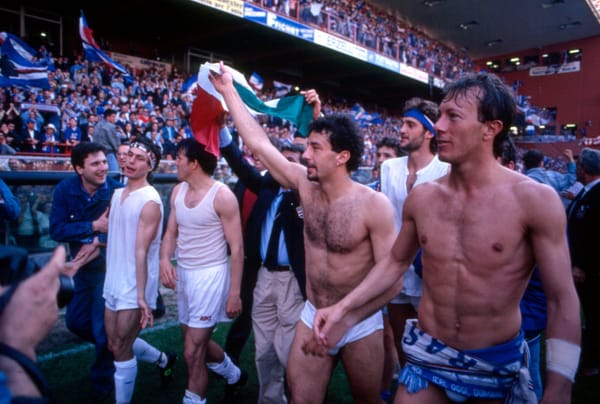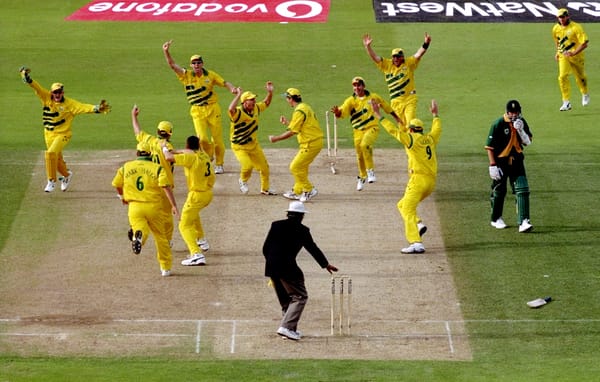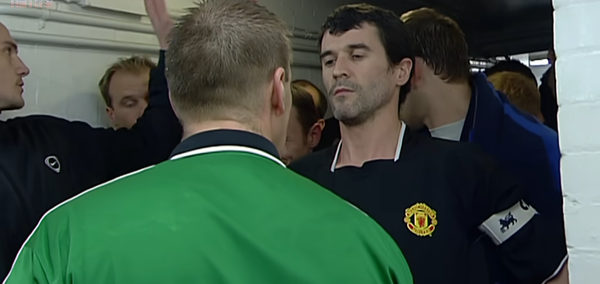The power of balance
John Barnes' imperious solo goal against the leaders QPR in 1987 showcased one of football's greatest qualities
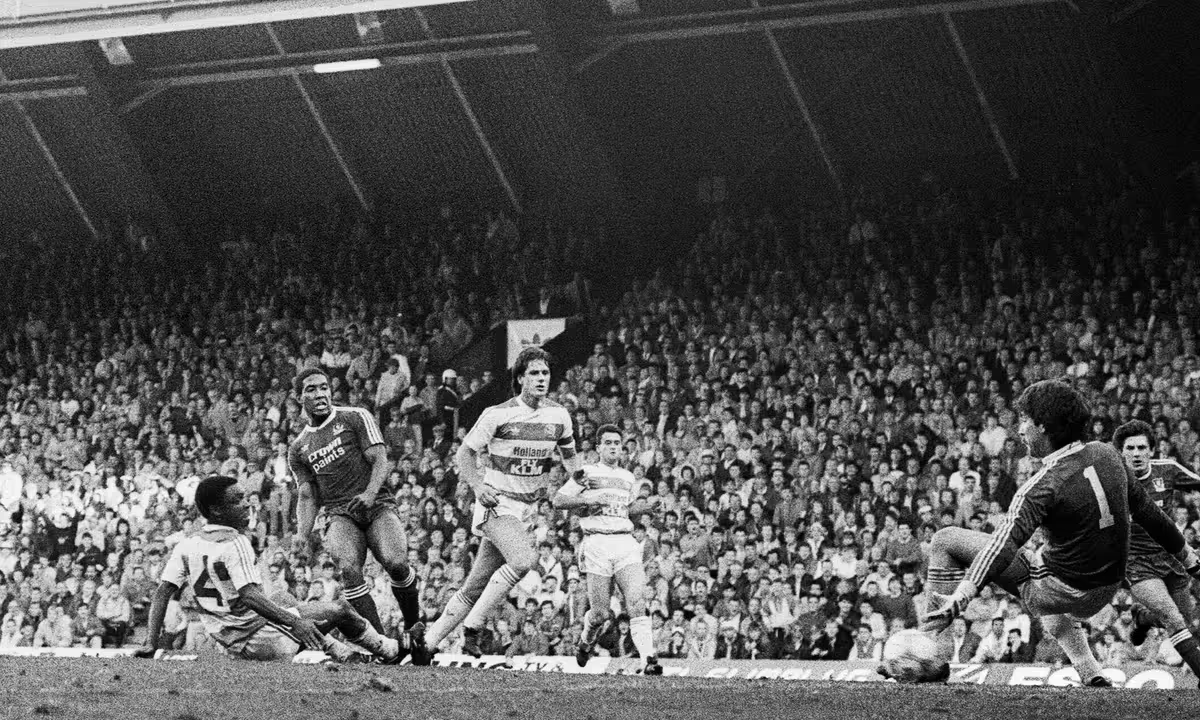
The spreadsheet is the new diary. Modern life is defined as much by numbers as feelings. Likes, retweets, calories, steps, pints. Yet there is no metric for euphoria, at least not yet, and so the richest human experiences are largely data-proof. Love, the arts, the humble orgasm – or its football equivalent. Few things in life compare to the moment when you, or more likely your team, score a goal of such brilliance or importance that you instantly know its memory will last forever.
On a basic level, goals are easy to quantify. Team goal: number of passes. Screamer: distance from goal. Solo goal: defenders beaten. But that’s a flawed, soulless enterprise. Don’t count the passes, especially if the first 20 are under no pressure whatsoever from the Serbia & Montenegro defence; feel the crescendo of the move. Don’t count how many defenders a player beats; look at how they do it, and when. Most of all, marvel at the things which makes solo goals so magical: the skill, the audacity and especially the balance.
Balance is a dribbler’s God-given friend, the thing which allows them to ride tackles or swerve left and right like a human F1 car. We know it when we see it, yet it’s a hard thing to fully understand. Apart from the use of simple adjectives – beautiful is the usual choice – it’s hard to find words for it. And it’s impossible to find data. We know great balance when we see it, though. Think of Diego Maradona staggering away from the scene of his genius against Belgium in 1986, George Best staying on his feet after being run over by Chopper Harris, or John Barnes twisting imperiously through QPR at Anfield in 1987.
Although Barnes only beat two players, he prefers this to his famous goal against Brazil at the Maracana. (Four defenders and the keeper, since you asked.) As well as its superior quality, Barnes’s goal endures because of its symbolic significance. The Brazil moment was a one-off, for him and England, whereas the QPR goal confirmed something brilliant was happening – that, after a dismal run of only one league title in three seasons, Liverpool were not only back but better than ever. It also completed Barnes’s rapid journey from unreliable outsider to darling of the Kop.
Wingers are supposed to leave defenders with twisted blood, not themselves. Barnes’s balance was even more impressive because of his build. Most great dribblers are short, skinny or both. Barnes was just shy of six foot, weighed 12 stone and had thighs that could kill a man. That gives his goal a unique elegance. It wasn’t football, it was foot-ballet.
The match was quite the big deal. Challengers v Challengers in the parlance of our times; second v first in the language of 1987. QPR, the league leaders, were having enormous success with their revolutionary tactics – a sweeper, man-markers and, most shockingly of all, patient possession football. The match was even going to be televised. Sort of. In 1987-88, non-live football was an event. These were the first highlights from any top-division match in almost two months. (There wasn’t even a full Match of the Day – it was part of Sports Special.)
Liverpool, who had to postpone some early home games because of the collapse of a sewer beneath the Kop, were three points behind Rangers with two games in hand, with the champions Everton in eighth. They had started the season spectacularly, and more than 3,000 fans were locked out when the gates were closed 35 minutes before kick-off. Ian Rush, who had joined Juventus in the summer, was back to see whether reports of Liverpool’s resurgence had been even remotely exaggerated.

They had not. “They are a better team than the one I left behind,” purred Rush. The match was pretty close for an hour, but eventually Liverpool’s class and desire overwhelmed Rangers. Barnes created the opening goal for Craig Johnston, took a free-kick which was handled in the box, giving John Aldridge a chance from the spot, and then scored twice with his right foot to complete a devastating 4-0 victory.
It was the fourth consecutive league game in which Liverpool had scored four goals. Their fans were used to winning, but not like this. They knew they were watching easily their most exciting team since 1978-79, probably ever.
Barnes’s second goal was certainly without precedent. It started when he did his own dirty work by winning the ball off Kevin Brock near the halfway line. From there he surged unchallenged towards the edge of the area, where Alan McDonald and Terry Fenwick were waiting like a pair of bouncers. Barnes approached them with the preparatory stride of a hurdler, which is exactly what he needed to be when McDonald lunged at him.
At that moment instinct took over, and everything slowed down.
The ability of great players to calculate so much in a split second is endlessly fascinating, and obliterates the view that footballers lack intelligence. Barnes’s reactions were fast enough for him to touch the ball to the left, away from goal, and gracefully avoid McDonald’s challenge in the same movement. His brain was even faster. As he jumped, Barnes registered in his peripheral vision that Fenwick, partially distracted by an off-the-ball run from Peter Beardsley, had left a small gap on the inside.
Barnes, whose body was facing towards the corner flag, then started to change direction in mid-bloody-air. As he landed he guided the ball back inside Fenwick to move through on goal. Even the weight of the touch was perfect – heavy enough to take Fenwick out of the game but not so heavy as to bring the covering defender Paul Parker or the goalkeeper David Seaman into it. Having beaten both McDonald and Fenwick in one impossibly smooth movement, the finish was an orgiastic formality.
There’s an extraordinary amount going on in the space of two or three seconds, but it’s Barnes’s balance and mid-air twist which elevate the goal into the realms of genius. He gave new meaning to the phrase “flying winger”. Try it at home if you like, but know first that Ntzr accepts no legal responsibility for pulled muscles, shattered coffee tables or accidental death.
Wingers are supposed to leave defenders with twisted blood, not themselves. Barnes’s balance was even more impressive because of his build. Most great dribblers are short, skinny or both. Barnes was just shy of six foot, weighed 12 stone and had thighs that could kill a man. That gives his goal a unique elegance. It wasn’t football, it was foot-ballet.
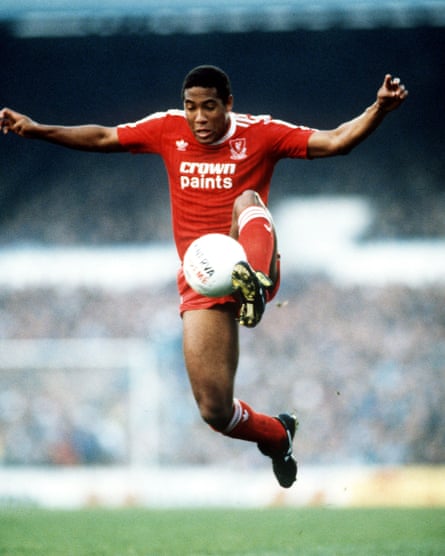
The QPR goal made Barnes a Liverpool idol, which was unlikely a few months earlier. His move to Anfield was so protracted – he was in love with Serie A and originally wanted to go to Milan or Juventus – that there was a hostile attitude towards him when he arrived. Oh, and he was black. Dave Hill’s staggering Out of His Skin covers this in detail, but the extent of the racism is stunning. There were various neanderthal insights daubed on the stadium walls, including ‘“LIVERPOOL ARE WHITE’” and ‘“NO WOGS ALLOWED’”. When Barnes first went to Anfield, one of the staff served everyone a cup of tea except him. “What,” said Barnes, “am I black or something?”
Barnes thinks he would have been booed on his home debut had the sewer not burst. Instead, word got back from the hardcore away support about his performances; by the time he made a spectacular home debut against Oxford in mid-September, the mood had softened. When he scored those goals against QPR, it melted. For his first four seasons at Anfield, where he received a freedom and an affection he didn’t get with England, Barnes was awesome.
In 1987-88, the BBC’s Goal of the Season was made up entirely of those scored by Liverpool players. Even in Liverpool’s greatest team, Barnes stood out. He won the PFA and FWA Player of the Year awards, scored 15 league goals and produced moments of skill that blew the mind. In Out of His Skin, Hill picks out one abracadabra turn against Everton that left Peter Reid eating mud and Gary Stevens in a different postcode. Until YouTube, it had the mythical quality of a great bootleg album.
The QPR game was, because of the BBC highlights, an instant classic. “Our performance was astonishing,” said Barnes in his autobiography. “The memory of that match burns more vividly in my mind than any other I played for Liverpool.”
You can’t put that sort of feeling on a spreadsheet.

